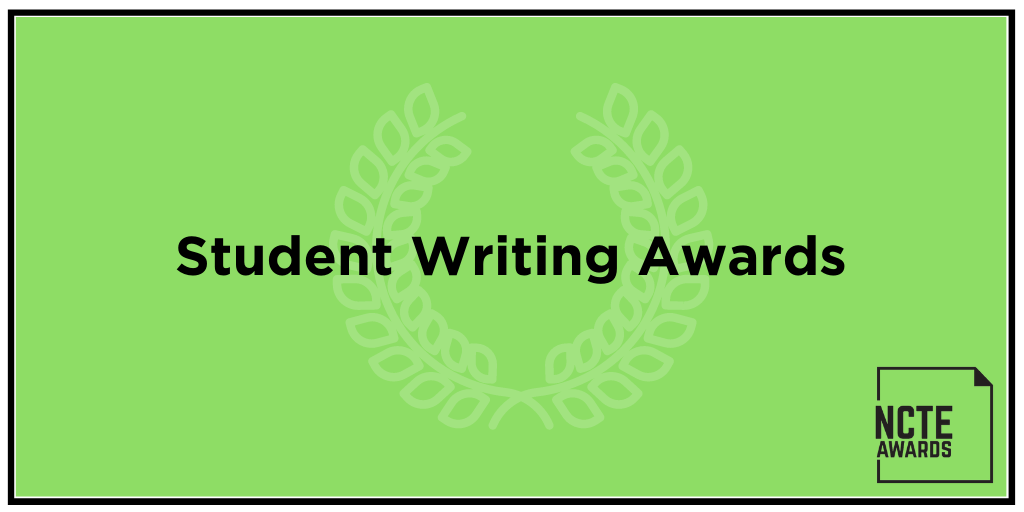This post is by NCTE member Wendy R. Williams, chair of NCTE’s Achievement Awards in Writing Advisory Committee.
As the new school year kicks off, English teachers may be on the lookout for new ways to engage their students in writing. Fortunately, NCTE offers a range of resources to inspire and support teachers and their students. One of my favorite NCTE resources is the annual Achievement Awards in Writing (AAW) contest for high school students. I have been a member of the contest’s advisory committee for the past four years and currently serve as chair. The AAW Advisory Committee consists of a number of dedicated writing teachers and scholars from around the country who come together each year to recommend prompts for the contest. In this post, I outline some of the exciting changes in the works for this contest and give a preview of the next themed prompt.
In the past, this contest has been open only to high school juniors. However, the 2023 contest will be open to sophomores and juniors. In addition, students will submit just one piece (the response to the themed writing) instead of two pieces. Submissions can be up to ten pages in length.
The committee understands the importance of multimodal writing and has advocated for more variety in the types of writing students should be able to submit to this contest. We know that students write in a variety of forms in their out-of-school lives (e.g., songwriting, spoken word poetry, short films, animated works, photo essays, comics). The committee seeks to honor student creativity and multimodal literacy, which is why recent contests have expanded to include comic and graphic narrative and photo essay options.
In recent years, prompts have asked students to explore hope or community or to reflect on who they are as writers. Looking ahead to the 2023 contest, our next prompt will focus on education. This prompt grew out of an excerpt from a speech by Malala Yousafzai. We know that students have a lot to say about school, and adults can learn a lot by listening to them.
The committee structured the 2023 prompt so that a variety of responses will be possible. Students can tap into their experiences and interests and consider their larger purpose for writing, such as to inform, persuade, or entertain. One option that students will have is to reflect on their own experiences of school and consider the most important things they have learned (or even the larger purposes for education). Another option is to explore an issue or problem currently facing schools and propose a solution. Alternatively, students could conduct primary research to learn about other people’s perspectives about education, or they could gather secondary sources to better understand how schooling works in different countries. If these options are not enough to spark student interest and creativity, then there is my personal favorite: to think about how schools should change and imagine what their dream school would look like. There will also be an option to respond to a provided quote from Malala Yousafzai’s speech.
Students should choose a form of writing that suits their purpose and message. For example, a piece might take the form of an informative essay, a persuasive essay, a research report, a fictional story, a personal narrative, a series of poems, a photo essay, or a comic or graphic narrative.
If you teach high school, please help us spread the word about this contest and consider encouraging students at your school to write for it. You can learn more about the contest through the Achievement Awards in Writing website. (The contest website has been updated with the 2023 prompt and the contest deadline is usually set for mid-February.) And if you teach middle school, no worries. NCTE has you covered with a Promising Young Writers contest for younger writers.
It is the policy of NCTE in all publications, including the Literacy & NCTE blog, to provide a forum for the open discussion of ideas concerning the content and the teaching of English and the language arts. Publicity accorded to any particular point of view does not imply endorsement by the Executive Committee, the Board of Directors, the staff, or the membership at large, except in announcements of policy, where such endorsement is clearly specified.

Dr. Wendy R. Williams is an associate professor of English at Arizona State University, chair of NCTE’s Achievement Awards in Writing Advisory Committee (2020–2022), and former Teaching Creative Writing column editor for English Journal. Wendy is the author of Listen to the Poet: Writing, Performance, and Community in Youth Spoken Word Poetry and is currently at work on two books (on visual storytelling and mentoring youth writers).

